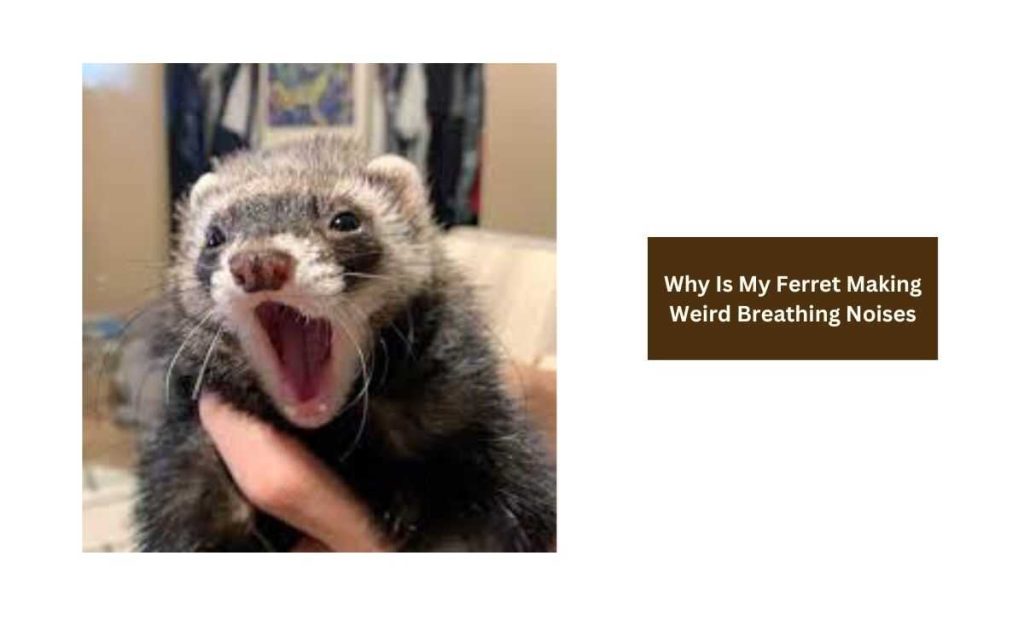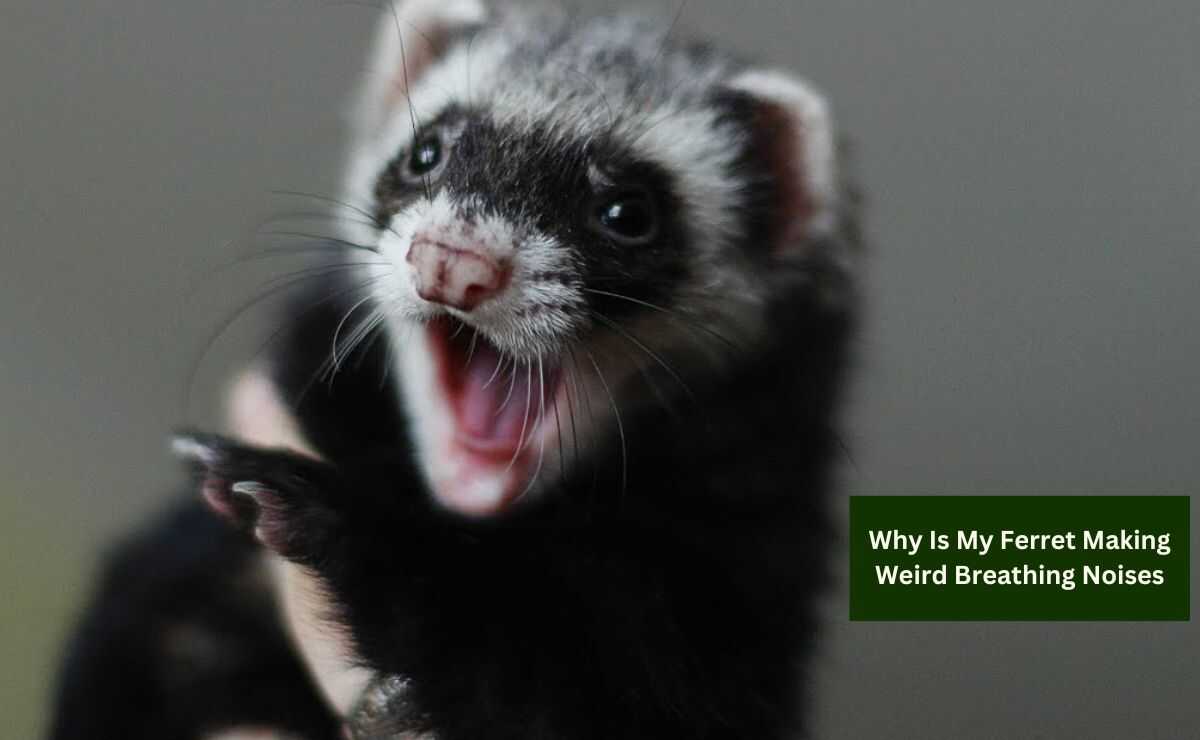While ferrets are known for their playful and curious nature, they are also susceptible to certain health issues. Just like dogs, cats, and other pets, ferrets can also have various inhaling infections and diseases. As a result, they can make weird noises.
Ferrets can make a range of sounds. But if you notice sound while breathing, you should be concerned about it.
As a pet parent, you should understand why my ferret is making weird breathing noises. If your ferret is infected with respiratory issues, allergies, sinusitis, and other diseases, it can make weird noises. So you should immediately consult with a veteran for your ferret treatment.
Why Is My Ferret Making Weird Breathing Noises?

If you’ve noticed that your ferret is making weird breathing noises, it’s important to investigate further to ensure their health. When ferrets make unusual breathing sounds, it could be an indication of a potential illness, possibly pointing toward an upper airway obstruction.
Here are some common reasons for breathing noises:
1. Respiratory Infection
Respiratory infection is one of the most possible reasons for your ferret’s unusual breathing noises. It is relatively common in ferrets when affecting either the upper or lower respiratory tract.
Due to viruses, bacteria, or other irritants, the infection occurs in the upper respiratory tract. It primarily impacts areas such as the nasal passages, larynx, nose, sinus, and trachea. Conversely, lower respiratory infections are centered on the lungs and bronchi.
Common symptoms of a respiratory infection are:
- Nasal Discharge: One of the hallmark signs of a respiratory infection is the presence of nasal discharge, which can be clear or discolored.
- Sneezing: Sneezing is observed as a response to the irritation caused by the infection.
- Coughing: Similar to humans, ferrets with respiratory infections may experience coughing spells.
- Wheezing: When ferrets have difficulties breathing, they make wheezing sounds which is another indicator of a respiratory issue.
- Open-Mouth Breathing: When your ferret resorts to open-mouth breathing, it’s a clear sign that their respiratory system is compromised.
- Ear Discharge: In some cases, ferrets may also develop discharge from their ears due to the infection’s impact on their respiratory passages.
3. Coughing fits
Coughing involves the lower airways (trachea and lungs). If your ferret is affected by the infections, they will have problems in breathing. Ferrets cough to clear the way of the lungs of an obstruction or fluid. Due to coughing, they also make weird wheezing sounds and struggle to breathe.
A little cough is nothing to worry about. Sometimes they may want to remove some dust or hair that is stuck or tickled in their throat. Ferrets are notorious for getting into tight spaces and exploring everything in their environment. This can sometimes result in them inhaling small objects or debris.
However, the frequency is multiple times a day, which is an indication of a bigger health concern. Ferret’s body can produce mucus as a defense mechanism. However, this increased mucus can become an irritant for your pet, potentially triggering bouts of coughing.
On a more critical note, coughing fits can also serve a vital purpose like clearing the lungs of accumulated fluids. During inhalation, fluid can build up in the lungs and cause coughing and wheezing.
3. Asthma And Allergies
Much like most animals, ferrets can also have asthma or allergy attacks. It can be triggered for various reasons like pollens, potent fragrances, and dust particles lurking in their environment. These triggers can lead to respiratory discomfort and the distinctive symptoms you may notice.
If you ever find your pet struggling for air, accompanied by pronounced wheezing, a bluish tint developing on their gums and tongue, or if they start losing consciousness, consider it a medical emergency. Rush your ferret to the vet without delay.
If you suspect that your ferret is grappling with respiratory distress, it’s wise to schedule an appointment with your veterinarian regularly to set the rules for managing asthma or allergies in your furry companion.
4. Cardiac Disease
Cardiac disease, or heart disease, is a common issue among ferrets, particularly in middle-aged to older. Due to this issue, ferrets can show signs of respiratory distress. These difficulties often signal the presence of underlying heart disease that has advanced to the stage of heart failure.
Congestive heart failure can lead to the accumulation of fluid in various body cavities, including the chest and abdomen, as well as around vital organs and tissues.
Ferrets can have fluid buildup in and around the lungs that can cause particularly distressing breathing problems. Ferrets in advanced stages of congestive heart failure tend to display lethargy, labored breathing, and a diminished appetite.
5. Sinusitis
Sinusitis is a condition that can afflict ferrets. It causes inflammation and, in some cases, infection in the sinus passages. Identifying the signs of sinusitis is crucial for treatment. You can notice a decreased appetite, nasal discharge, sneezing, noisy breathing, and sometimes open-mouthed breathing.
Sinusitis in ferrets can stem from various causes, including allergies and infections, such as those at the root of an upper canine tooth. While rare, fungal infections like cryptococcus can also lead to sinusitis in ferrets.
It’s imperative to seek veterinary examination and care if your ferret displays symptoms suggestive of this condition. Your veterinarian can provide a precise diagnosis and recommend appropriate treatment measures to alleviate your ferret’s discomfort and ensure their respiratory health.
What To Do If My Ferret Makes Weird Noise While Breathing?
If your ferret is making noise when breathing, it’s essential to address the issue. Carefully observe your ferret’s breathing and any accompanying symptoms. Note the type of noise, whether is it wheezing or coughing. Also, look for other signs of distress, such as lethargy, decreased appetite, or nasal discharge.
Try to identify the potential cause of the noisy breathing. It could be due to respiratory infections, allergies, or even cardiac problems.
If you are unable to suspect the cause, it’s crucial to consult a veterinarian who specializes in ferret care. They can perform a thorough examination, including X-rays or other diagnostic tests if necessary, to determine the underlying issue.
Furthermore, you need to ensure that your ferret’s living space is clean and well-ventilated. A clean environment can help reduce the risk of respiratory irritants. And lastly, provide a balanced diet appropriate for ferrets to support their overall health and immune system.
Frequently Asked Questions (FAQs)
Why is my ferret opening and closing his mouth?
If you notice your ferret repeatedly opening and closing its mouth, it means it is having difficulty breathing. It could be due to a respiratory infection, allergies, or other respiratory problems.
Ferrets are sensitive to heat, and in hot environments, they might resort to open-mouth breathing to cool down.
How do you treat a ferret with an upper respiratory infection?
Therapies like antibiotic treatment, intravenous (IV) fluids, nutritional support, and placing in an oxygen tent, can reduce the upper respiratory infection. Though a professional vet can provide the appropriate treatment for this infection.
Conclusion
Ferrets are adorable animals but they can be prone to illness. Making weird noises while breathing is not that common. It indicates various respiratory issues. Sometimes it can trigger severe issues.
So it’s crucial to seek professional veterinary care for an accurate diagnosis and appropriate treatment.
